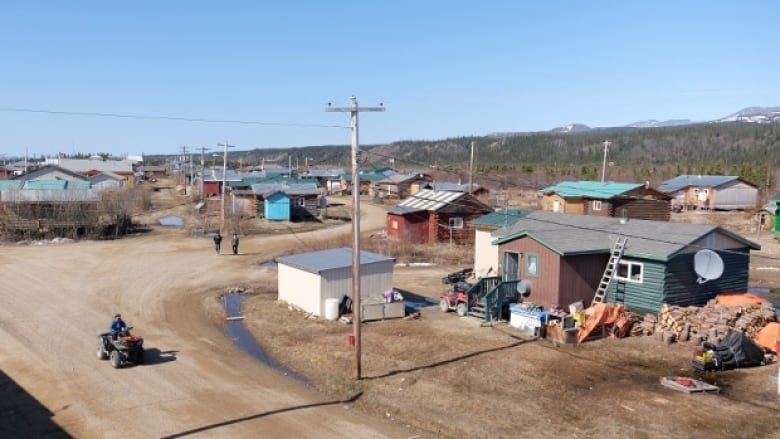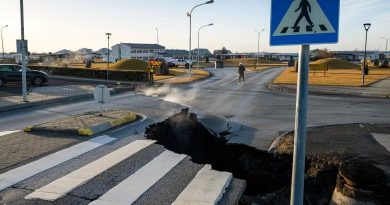Climate change driving food insecurity in First Nations communities while Canada stands by, report says

Human Rights Watch criticizes ‘inadequate’ government response to issue, calls for stronger climate targets
The federal government is not doing enough to support First Nations communities contending with food insecurity problems made worse by climate change — and is aggravating the situation by failing to adequately reduce greenhouse gas emissions — says a new report by the U.S.-based Human Rights Watch.
The warming climate is depleting traditional food sources in First Nations communities in Canada and making it difficult for Indigenous people to live off the land — forcing many to supplement their diets with expensive or unhealthy food imported from other parts of Canada and worsening pre-existing economic and health issues — says the report.
The report calls on the government to increase financial and technical support to First Nations to help them address the effects of climate change and to strengthen national climate policies with more ambitious targets for reducing emissions.
“The Canadian government has promised to deliver on climate action and also to protect Indigenous peoples’ rights,” said Katharina Rall, senior environment researcher at Human Rights Watch.
“So far, the response has been disappointing.”
The 122-page report — entitled My Fear is Losing Everything — is based on interviews with 120 First Nations community members, chiefs and council members in Yukon, northwestern British Columbia and northern Ontario, as well as medical providers, environment and health experts and other Indigenous leaders.
Food insecurity higher in Indigenous communities
Indigenous people living in Canada experience food insecurity — defined as a lack of regular access to safe, nutritious food — at higher rates than non-Indigenous people.
A 2018 national survey by the First Nations Information Governance Centre found that over half of Indigenous households experience food insecurity. Research from the University of Toronto estimates that just one in eight Canadian households overall suffers from food insecurity.
Human Rights Watch says wildlife habitat changes caused by melting ice and permafrost, more intense wildfires, warming water temperatures and increased precipitation are all reducing the amount of food available to Indigenous people in remote areas.
The report tells the story of Helen Koostachin, 56, and her husband Joseph, 58, who live in the remote community of Peawanuck in northern Ontario. The Koostachins told Human Rights Watch that the caribou, snow geese and fish they used to hunt and harvest were once plentiful.
The Canadian government has promised to deliver on climate action and also to protect Indigenous peoples’ rights. So far, the response has been disappointing.– Katharina Rall, researcher at Human Rights Watch
But since their grown children took over the responsibility of providing food for the family, fewer caribou and geese are migrating to the area. The Koostachins said that when they do, it is harder and more dangerous for the younger members of the family to hunt them because of unstable winter ice and permafrost, and unpredictably low water levels on waterways.
Unable to harvest enough food from the land to ensure an adequate diet, the Koostachins must purchase expensive imported food from grocery store.
Even with government subsidies to reduce the cost of food, healthy food items such as fresh fruit and vegetables remain inaccessible to many Indigenous people in remote communities, the report says.
“The Koostachins’ way of life, and livelihood, have become increasingly difficult to maintain, and the realization of their rights to food, health, and culture are at risk,” the report says.
Patchwork approach leaves gaps, says Human Rights Watch
In a statement, a spokesperson for the minister of northern affairs acknowledged the negative impact that climate change has on the Indigenous way of life.
“Indigenous Services Canada (ISC) and Crown Indigenous Relations and Northern Affairs Canada (CIRNAC) have been making direct investments in a variety of culturally appropriate, community-based programs and services that support food security and climate change resilience and adaptation in Indigenous communities for almost two decades,” said Allison St-Jean.
“We will continue to work with Indigenous communities and all Canadians to fight climate change and ensure a sustainable future for our kids and grandkids.”
St-Jean touted a range of programs meant to help Indigenous and Inuit communities address the health impacts of climate change, including the Climate Change and Health Adaptation Program.
The Nutrition North program provides subsidized food shipments to 116 isolated communities across the three territories and the northern regions of six provinces, St-Jean said.
Rall said that while there are government programs that provide support, it’s a patchwork with many gaps.
“Often the funding for the programs [is] short term [or] the funding isn’t enough to cover all First Nations to give them access,” said Rall.
“So it’s a matter of really stepping up the support for First Nations to then be able to lead solutions on adaptation in their communities.”
Canada must strengthen emissions targets: HRW researcher
In the meantime, Rall said, Canada will continue to fuel global climate change unless it adopts more ambitious emissions targets and a more concrete plan to achieve them.
Canada ranks ninth in the world in terms of CO2 emissions, according to the International Energy Agency, and a government report in 2018 found the country is warming at twice the rate of the rest of the world, with Northern Canada heating up at almost three times the global average.
Under the Paris Agreement, the federal government has committed to reducing its greenhouse gas emissions by 30 per cent below 2005 levels by 2030. The Liberals pledged during the last federal election to achieve net-zero emissions future by 2050.
The Human Rights Watch report criticized the federal government for falling behind on its 2030 target and for its lack of a clear plan to achieve the net-zero goal.
Related stories from around the North:
Canada: Canada slots nearly $15M for Nunavut harvesters, to improve food security, CBC News
Finland: Finland’s farming sector in crisis: report, Yle News
Norway: Norway and Russia agree to slash cod quotas in Barents Sea, The Independent Barents Observer
Sweden: 2018 drought took toll on Swedish farmers’ mental and fiscal health, research says, Radio Sweden
United States: This Alaskan spice shop brings new flavors to Indigenous dishes, Alaska Public Media



